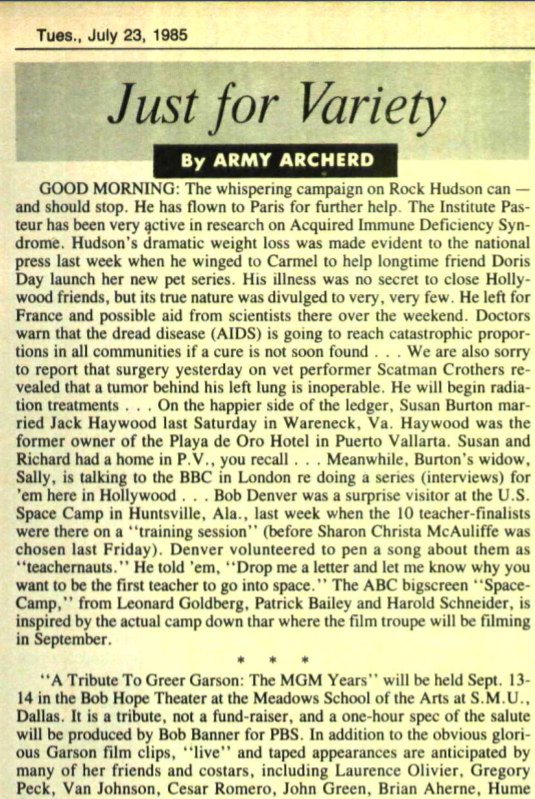A 100th Birthday Salute to Variety’s Army Archerd, Hollywood’s Original Blogger
- Oops!Something went wrong.Please try again later.

Today would have marked the 100th birthday of Army Archerd, the beloved Variety columnist who chronicled Hollywood’s inner circle for more than 50 years.
Archerd, who died in 2009, penned “Just for Variety,” a classic “three-dot” column (aka short items separated by ellipses) that had a prime anchor slot in Daily Variety‘s pages from 1953 until 2005. After that, the indefatigable writer continued to report news stories that ran in Variety and on his blog.
More from Variety
Michelle Sobrino-Stearns Promoted to Chief Executive Officer of Variety
Ramin Setoodeh Tapped to Lead Variety With Cynthia Littleton as Co-Editors-in-Chief
Archerd’s first column, published April 27, 1953, addressed the new sensation of 3-D movies and included 32 other news items — which means he averaged 150 exclusives a week. And yes, every item was exclusive: God help the poor publicist who double-planted a story with him and another news outlet, and had to face the Wrath of Army.
For decades, it ran five days a week, 900 words at a time, with the frequency eventually dropping to four times a week.
His column was like an industry bulletin board, with stories from film sets, TV tapings, the scoop on pending movie and TV deals and, of course, news of star-related travels, hospitalizations, marriages and births.
For 47 years, Army also had the glitzy role of serving at the Academy Awards, announcing red-carpet arrivals and interviewing Hollywood royalty as they entered the Pantages Theater, or the Dorothy Chandler Pavilion or the Shrine Auditorium or other Oscar venues of yesteryear.
Early in the 21st century, Variety described Army as “Hollywood’s original blogger,” which is pretty close to the truth.
Here’s a small sample of his work.
In 1958, he spoke with Marilyn Monroe and Billy Wilder at San Diego’s Hotel del Coronado on location for “Some Like It Hot.” Monroe told Army she wasn’t a “method” actress but “at the Actors Studio (where she’s an observer student), we go beyond ‘the method.”
Also that year, Archerd watched the filming of the chariot race for “Ben-Hur” in Rome and brought the footage he’d shot on his 8mm camera to MGM execs in L.A. Since MGM didn’t have an 8mm projector, Army brought his from home; it was the first footage they’d seen of their $15 million film and they were relieved it looked so good.
In February 1967, Army reported that “Bob Redford” had convinced director Mike Nichols that he was too old to star in “The Graduate.” The next month Archerd spoke with Nichols and Anne Bancroft who assured him that, despite reports elsewhere, the film was “not dirty.”
In 1970, the FBI fed Army a fake report that Jane Fonda had threatened the life of Richard Nixon, hoping “to cause her embarrassment” and turn the public against her as retaliation for her anti-war activity. Army never ran the item.
Some of his items were eyebrow-raising in a different way, like the fact that Ingmar Bergman was a frequent visitor to the Stockholm set of 1972’s “The Day the Clown Cried” because he was “a devotee of Jerry Lewis.”
Director Richard Donner confided in Army that he was thinking of casting an unknown as Superman in the 1978 film (Christopher Reeve wouldn’t stay an unknown for long.)
On April 30, 1980, “Carbon Copy” director Michael Schultz praised the unknown Denzel Washington for his talent and “magnetism,” comparing him to a young Sidney Poitier.
Army also had a keen eye for talent. After a preview of “Pretty Woman,” on March 21, 1990, Army declared that Julia Roberts “is headed for heavy stardom.”

Archerd’s life work amounted to a fascinating cross-section of Hollywood for a half-century. But his single most famous item was a July 23, 1985, report that Rock Hudson was being treated at the Institute Pasteur in Paris, which specialized in research on Acquired Immune Deficiency Syndrome. Hudson’s publicist demanded a retraction but Army held firm and of course was proven right.
Some criticized the column for outing Hudson. But it came at a time when President Ronald Reagan and everyone else in Washington refused to talk about AIDS, which was considered a shameful disease confined to homosexuals and Haitians. So this was big news: For the first time, the public could link the disease to a face, which made it more real. In the column, Archerd stated his reasons: “Doctors warn that the dread disease (AIDS) is going to reach catastrophic proportions in all communities if a cure is not soon found.”
Archerd’s activism took a different path when Michael Jackson’s “HIStory” album was released in 1995. He chastised Jackson for a song in which he used phrases like “Jew me/Sue me.” A few days later, Jackson called Army to report he was re-recording the song with new lyrics.
Like 21st century celebs, Army worked to build his brand.
TV audiences knew him from his guest shot appearances on shows including “Batman,” “Columbo,” “The Love Boat” and “Murphy Brown.” He and his wife Selma appeared as a celebrity couple on the quiz show “Tattletales.” And he was a key part of “The People’s Choice Awards” starting in 1975, eventually getting credited as associate producer, then producer, through its 29th edition in 2003.
On June 27, 1984, Archerd became the first journalist to get a star on the Walk of Fame; it was in front of Mann’s Chinese (now TCL) where he emceed many movie premieres.
Archerd started in the days of Walter Winchell, Hedda Hopper and Louella Parsons and ended his run in the era of TMZ and Twitter. In his obituary, Variety noted that he had the chance to hang out with stars “before the onslaught of celebrity journalism created a wall between scribe and subject.”
At a dinner celebrating his 50 years with Variety, a photo slide show featured snaps of him with virtually every major Hollywood of his era, including Lucille Ball, Marlon Brando, Carol Burnett, Judy Garland, Whoopi Goldberg, Alfred Hitchcock, George Lucas, Mickey Mouse and John Wayne, to name a few. The slide show lasted 45 minutes.
On Sept. 1, 2005, he ended his print column before transitioning to a blog. He wrote in print: “I’m still here… my greatest joy will always be getting a scoop. The byline will be the same, but it will be atop an occasional story and not atop the column.”

Michael Buckner/Shutterstock
When Army died in September 2009 of mesathelioma, the speakers at his memorial included Poitier, Steven Spielberg and me, I’m proud to say. Army and I worked together for decades.
His legacy lives on. The “Just for Variety” column started in 1945, written by Marshall Kester. There were several other scribes who wrote it for a few years, including Sheilah Graham, Army’s immediate predecessor.
In December 2020, Variety revived “Just for Variety” for a new era, handing the pen to Marc Malkin, the E! and Premiere magazine alum who joined the brand in 2018.
The new steward of “Just for Variety” just celebrated his first anniversary of writing the revived column. And, to Mr. Archerd, Happy Birthday and a hearty thanks from everyone at Variety. We owe you a debt of gratitude for delivering work that mattered in its moment and also endures as a sui generis chronicle of Hollywood history.
(Pictured: Army Archerd interviews Dolly Parton on the Academy Awards red carpet in 1980.)
Best of Variety
Sign up for Variety’s Newsletter. For the latest news, follow us on Facebook, Twitter, and Instagram.

